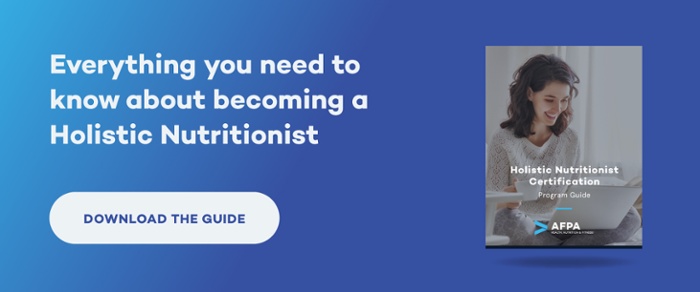It may surprise you to learn that protein intake guidelines have been the subject of debate among nutrition associations, sports nutritionists, medical doctors, and other professionals with an interest in nutrition.
While there are standard guidelines that are promoted by state entities for the general population, many nutrition associations worry that the recommendations are too low for certain populations or that they don’t take into account how much of that protein is actually absorbed.
In this article, we have summarized the protein recommendations from different entities for you to consider when planning your own meals or making recommendations to your clients.
Become a Certified Holistic Nutritionist Online in 6 Months or Less
Differing Protein Recommendations
Different entities have put out varied recommendations based on study methods and target population.
Below is a summary of the main recommendations:
- For healthy, sedentary adults, the official USDA Recommended Daily Allowance (RDA) of protein is 0.8 grams of protein per kilogram of body weight daily.
- An alternate RDA of protein for healthy, sedentary individuals based on Improved Statistical Analysis of USDA Data is between 0.93 and 1.3 grams of protein per kilogram of body weight daily.
- For athletes, the Academy of Nutrition and Dietetics recommends between 1.2 and 2.0 grams of protein per kilogram of bodyweight.
- For athletes aiming to build and retain body mass, the International Society of Sports Nutrition recommends between 1.4 and 2.0 grams of protein per kilogram of body weight daily. This recommendation increases beyond 3.0 grams of protein per kilogram of bodyweight for resistance-trained athletes and athletes on hypocaloric diets.
Your protein needs may increase to over 3 grams per kilogram of body weight daily if:
- You are older, as people lose muscle mass as they age due to sarcopenia.
- You are pregnant, to support fetal growth.
- You are lactating, to support milk production.
- You are sick or injured, to support cell renewal and reconstruction.
- You want to increase body mass (“bulk up”).
- You follow a plant-based diet, to ensure protein absorption and offset the effects of some antinutrients.
If you’re considering a career in yoga instruction, AFPA’s yoga certification course is a great place to start.
Need More Information?
AFPA has developed several research-backed resources on the topic of protein intake and supplementation for standard and plant-based diets. If you want to learn more, take some time to explore them here:
- Do Plant-Based Diets Meet Protein Needs?
- Coach Resource: Comparing 10 Plant-Based Protein Supplements
- What Protein Is the Best for Muscle Growth?
- Protein Supplements: What They Can and Can’t Do for You
- 6 Things to Look Out for Before Taking (or Recommending) a Supplement




